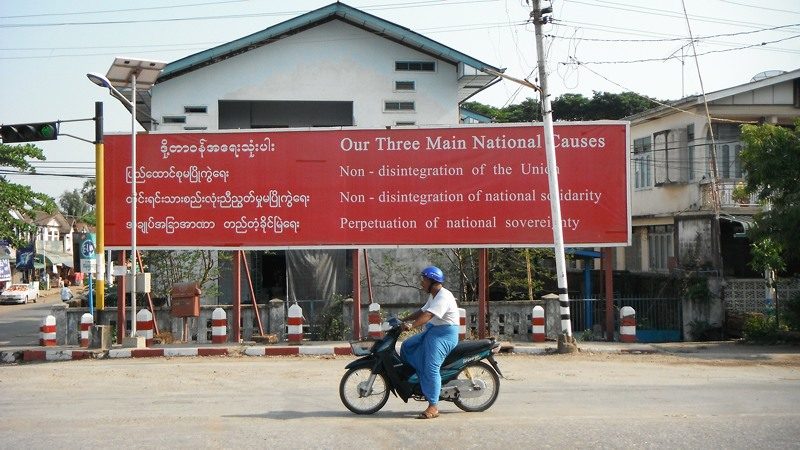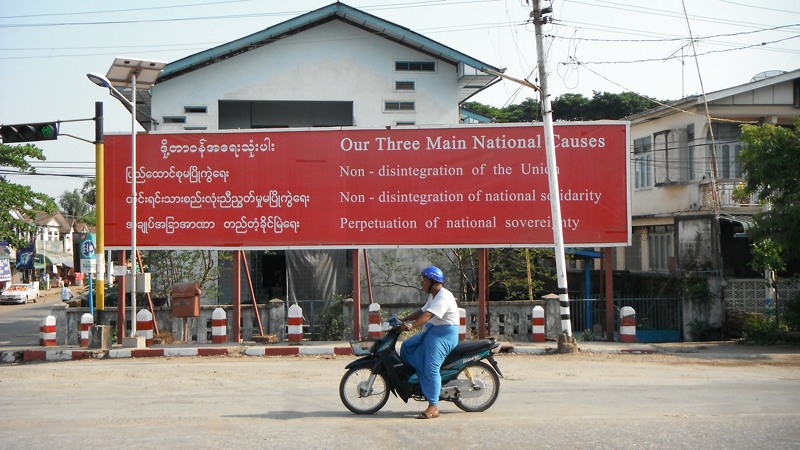The recent bombings in Myanmar have increased insecurity. People fear an unknown perpetrator with an unknown agenda. There is a lot of speculation. Are the perpetrators frustrated ethnic minorities, radical Buddhists, Muslim extremists or are elements from the government behind the attacks? One thing is certain, the bombings pose yet another threat to peace in Myanmar.
Over fifteen bombs have exploded in the last week. The bombs have gone off in areas all over the country and even though it seems there is structure in organizing them, the targets and objectives are hard to detect. If they were planted to cause serious mayhem they would have failed since as, so far, only a few, regrettable, deaths have been reported. It seems they are interested in sending a message, but it is an unclear one. Who they are targeting is another unanswered question. A bomb has gone off in Traders Hotel, one of the high-end hotels in Yangon, but also at a bus stop elsewhere in the city and over the last few days bombs have exploded in ethnic areas as well.
Meanwhile, eight men have been arrested with regards to the bombings. The Democratic Voice of Burma reports that the police say they have found that a group of Karen businessmen, wishing to deter foreign investment, are behind the bombings. Soe Myint Lwin, who was allegedly paid to carry out the attacks, is a former member of the Karen National Union, one of the ethnic armed groups in Myanmar. Khun Htun Oo, chairman of the Shan Nationalities League for Democracy (SNLD), is convinced the KNU has nothing to do with the recent bomb explosions though. According to him the ethnic groups as well as the government are sincere about their commitment to peace and therefore would not risk jeopardizing the peace process.
This kind of violence is not new to Burma, as Wai Moe reported for the Irrawaddy in 2010. He sums up a long list of explosions from 2006 to 2010. Speculation about the perpetrators was then as complex and confusing as it is now. Most of the groups he mentions that could potentially be involved haven’t changed today. It could be elements of the ABSDF, “or rather, radical elements loosely associated with the former student army”, or members of one of the other armed groups in the country. Though, Moe Thee Zun, one of the founders of the ABSDF, explains that no members of armed groups on the border would plant the bombs as almost all of these groups have members now living in Yangon and it would threaten their security, as well as the current peace process.
Now, there is speculation about the involvement of elements from the government. It is not a secret that in Myanmar not everybody in the military is happy about the current reforms. It might therefore be possible that the bomb blasts are an attempt to disrupt the current transition, in order to retain power for the military. U Pyi Kyaw, a monk and former political prisoner, says the government or military is not behind the attacks because they would never target businesses, like Traders Hotel, owned by people with strong links to the government.
This time, Muslim extremists are added to the list of potential perpetrators. U Pyi Kyaw says he knows that Muslim extremists, trained in Southern Thailand, are behind the attacks. They would have paid Soe Myint Lwin to carry out the bombings. Moe Thee Zun, one of the leaders of the ’88 uprising, does not think Muslim extremists are behind the attacks, as that could very well lead to an escalation of violence against them and would therefore significantly increase insecurity for all Muslims in Myanmar. But this issue is in the minds of many. The sense of security of people all over the country has strongly diminished since religious violence started in 2012. But also this kind of violence, just like the bombings, is not a new phenomenon in Myanmar.
The International Crisis Group pointed out in their report from 1 October 2013 that inter religious conflict partially stems from the colonial period. When the British colonized Myanmar, then still Burma, many Indians were brought to Burma to work in the colonial administration. As a consequence, “large numbers of Myanmar agricultural workers moved to the cities seeking jobs held by Indian immigrant laborers, creating tensions.”
Nowadays, unemployment and a lack of opportunity might provide an explanation. In Myanmar, the economy has been bad for decades, but never before did the people of Myanmar have the freedom to act upon their frustrations. Now years of anger about a lack of employment and opportunity in a country of about 60 million people is finally finding its way out into the open. This frustration seems to be targeted towards the Muslim population. Poverty could also be a reason for the involvement of Buddhist monks in the violence. People join monasteries for different reasons but, often, it is partly motivated by poverty.
Many people, from taxi drivers to shop attendants, voice disappointment over the current democratisation process. Nothing has changed, they say, they still struggle to provide for their families and opportunities are limited. Everybody who has taken a taxi in Yangon has probably had a graduate engineer, former school teacher or certified lawyer as their driver; they cannot get a job in their own field or get paid too badly to stick with it. Attention is focused on creating a ‘peace dividend’ in the ethnic areas, but because there is no fighting in the cities, similar policies do not seem to be implemented in central Myanmar.
People do not understand why their livelihoods have not yet improved. They thought the magic of the word “democracy” would change their country, but now they are becoming impatient. It is thus not surprising that frustration and anger has been building up for years, but is now not as closely suppressed, is boiling over. Not knowing where and when this will happen adds to a feeling of insecurity among the people of Myanmar.
Yola Verbruggen is a political scientist based in Yangon
 Facebook
Facebook  Twitter
Twitter  Soundcloud
Soundcloud  Youtube
Youtube  Rss
Rss 
